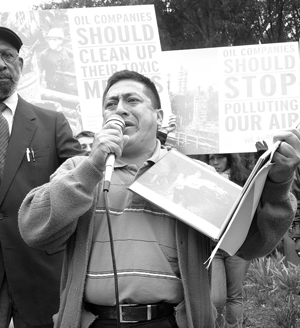Last week three courageous Ecuadoreans traveled from the Amazon to Chevron’s shareholder meeting in San Ramon, CA to take their calls for justice directly to the company’s management, board, and shareholders. Even I was shocked by Chevron’s callousness and disregard for the human suffering caused by its business operations.
I wrote a post last Wednesday discussing the anger, frustration, and unwavering resolve that the Ecuadoreans expressed upon leaving the shareholder meeting. Servio Curipoma, a farmer who lost both his parents and his sister to cancer after Texaco, which Chevron bought in 2001, dumped a massive amount of oil pollution near their home in the Ecuadorean Amazon, gave the most impassioned and moving speech of the day. See for yourself (Servio starts speaking at about 00:40):
[youtube KBFInCkFi70 550]
What was Chevron’s response when confronted with the very face of the human suffering it has caused in Ecuador? CEO John Watson responded that it is the oil giant that is the victim in Ecuador. Then, in an even more cowardly move, the husband of a senior Chevron employee posing as an independent journalist emailed some donors to RAN and Amazon Watch to get quotes for a hit piece he was planning on publishing.
Humberto Piaguaje, a leader of the Secoya people in the Ecuadorean Amazon, stood up at Chevron’s shareholder meeting to tell Watson and Chevron’s shareholders, ”I want to remind you that our fight in Ecuador is for life and justice. You must own up to your responsibility to the people in the Amazon.” As the SF Chronicle reported, Watson later responded to these pleas for justice by saying that Chevron is the one “being victimized.”
It was a shameful attempt to distract from the overwhelming evidence of Chevron’s guilt — evidence that led to a conviction in February and a judgment of $18 billion that the company has been ordered to pay to clean up its mess in the Amazon. But it was only one of the heartless and cowardly responses Chevron cooked up last week.

As reported by Triple Pundit, Alex Thorne — husband of Kristen Thorne, Chevron’s senior policy advisor on environment and energy issues — “decided that he would help his wife out” by emailing donors to RAN and Amazon Watch while representing himself as an independent journalist to ask them if it was time to reconsider their support of both organizations given the fraud allegations made as part of Chevron’s attack-the-victims legal strategy. Thorne conveniently left out his last name and didn’t mention the publication he was writing for in his emails.
Thorne’s came out the next day and it was every bit as factually challenged and one-sided as you’d expect. There’s no doubt he was working purely to regurgitate Chevron’s talking points, whether he is actually paid by Chevron or not. The piece was so bad, in fact, that Thorne didn’t even put his name on it. He also didn’t allow comments on the post. What does it say about Chevron’s PR and legal strategy when even the guy doing the company’s dirty work won’t put his name on it or allow feedback from his audience? I think we all know exactly what that says.
This was no doubt retaliation by Chevron after some of the truths RAN and Amazon Watch have helped expose about the company led to several influential investors calling on Chevron to settle with the Ecuadoreans. “In failing to negotiate a reasonable settlement prior to the Ecuadorian court’s ruling against the company, we believe that Chevron displayed poor judgment that has led investors to question whether our Company’s leadership can properly manage the array of environmental challenges and risks that it faces,” the investors wrote in a letter to Chevron.
All of which just supports what I described last week as “my main takeaway” from the protests inside and outside of Chevron’s shareholder meeting: There is no amount of human suffering so great that Chevron can’t ignore all that in its quest for power and money.